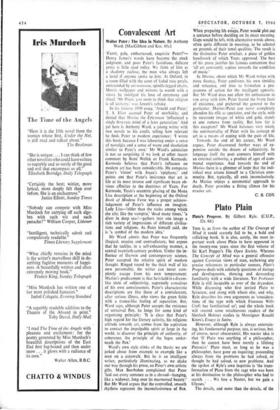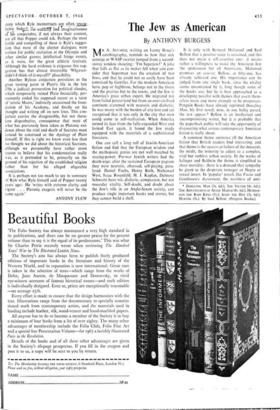Plato Plain
THIS is, as from the author of The Concept of Mind it could scarcely fail to be, a bold and rollicking book. It is also, surely, the most in- portant work about Plato to have appeared in thb twenty-one years since the first volume of Sir Karl Popper's The Open Society. Whereas The Concept of Mind was a general offensive against Cartesian views of man, eschewing any precise references to particular sources, Plato's Progress deals with scholarly questions of datings and developments, showing and demanding familiarity with a wide literature. Yet Professor Ryle is still incapable as ever of the dryasdust. While discussing who first invited Plato to Syracuse, and along with whom else, and why, Ryle describes his own arguments as 'considera- tions of the type with which Freeman Wills Croft has familiarised us'; and the whole book will remind some mischievous readers of the Sherlock Holmes studies in Monsignor Ronald Knox's Essays in Satire.
However, although Ryle is always entertain- ing, his fundamental purpose, too, is serious, but, of course, never obscurantist. His master idea is that 'If Plato was anything of a philosopher, then he cannot have been merely a lifelong Platonist.' Plato must, so long as he was a philosopher, have gone on inquiring; proceeding always from the problems he had solved, or thought he had solved, to new problems. And the upshot of Ryle's own inquiries is 'the trans- formation of Plato from the sage who was born at his destination to the philosopher who had to search. . . . We lose a Nestor, but we gain a Ulysses.'
The details, and more than the details, of the story which Ryle reconstructs are °nett
lative. ',hi-atlas-Ay and imaginativeness or his conjectures, if not always their content, are all that Popper could ask. Perhaps the most fertile and compelling of these is Ryle's sugges- tion that most of the shorter dialogues were written for public recitation at the Olympic and other similar games; intellectual fringe events, as it were, for the great athletic festivals. Although the hard evidence is exiguous this sug- gestion has that almost irresistible 'Whyever- didn't-I-think-of-it-myself?' plausibility.
Another Rylean conjecture postulates as the great turning point in Plato's life in the late 370s a judicial prosecution for political slander, which temporarily ruined Plato financially, per- manently ended his supposed career as a tutor of `eristic Moots,' indirectly occasioned the foun- dation of his Academy, and finally set his thought and writing off on new lines. This con- jecture carries the disagreeable, but not there- fore disprobative, consequence that most of what has previously been taken as Platonic evi- dence about the trial and death of Socrates must instead be construed as the Apology of Plato himself. If this is right we know even less than we thought we did about the historical Socrates; although we presumably have rather more reason to believe that his condemnation really was, as it pretended to be, primarily on the ground of his rejection of the established religion rather than for his alleged oligarchic associations.
It is perhaps not too much to say in summary of Ryle what Ryle himself said of Popper twenty years ago: He 'writes with extreme clarity and vigour . . . Platonic exegesis will never be the same again.'
ANTONY FLEW



































 Previous page
Previous page